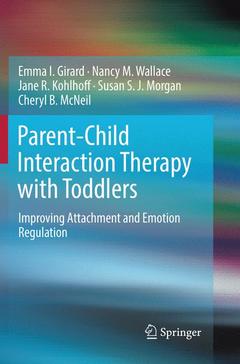Parent-Child Interaction Therapy with Toddlers, Softcover reprint of the original 1st ed. 2018 Improving Attachment and Emotion Regulation
Auteurs : Girard Emma I., Wallace Nancy M., Kohlhoff Jane R., Morgan Susan S. J., McNeil Cheryl B.

This book presents an early treatment model for toddlers. It describes the early life span development, trajectory, and future potential of toddlers and how it may be powerfully influenced by the protection and guidance of caregivers to meet toddlers? physical and mental health needs. It offers an in-depth guide toParent-Child Interaction Therapy with Toddlers (PCIT-T), an evidence-based program for addressing and preventing behavior problems affecting young children?s development. The book details the innovative intervention design and how it guides clinicians in providing treatment for 12-month old to 24-month old toddlers with disruptive behaviors in addition to being used as a prevention model for caregivers experiencing stress of child rearing.
PCIT-T focuses on core areas of social and emotional development, including behavior management and language skills, and can be used in dealing with difficulties as diverse as tantrums, language issues, autistic behaviors, and separation anxiety. Play therapy and compliance training in child-directed as well as parent-directed sessions are also examined. Initial chapters provide an overview of attachment and behavioral theory components that are foundational to the treatment model. Subsequent chapters provide a session-by-session guide and clinical manual for implementation of PCIT-T as well as the clinician tools needed to monitor treatment integrity and fidelity to the model.
Topics featured in this book include:
- Core elements and treatment goals of PCIT-T
- A range of behavioral assessments used in PCIT-T.
- Instructions for room set-up, toy selection, and special considerations when providing PCIT-T treatment.
- Preparation guides for the pretreatment interview, assessment sessions, and weekly coaching sessions.
- The importance of child-directed interaction toddler (CDI-T) and parent-directed interaction toddler (PDI-T) in teaching children the necessary skills to regulate their emotions and develop self-control.
Parent-Child Interaction Therapy with Toddlers is a must-have resource for clinicians and related professionals, researchers and professors, and graduate students in the fields of clinical child and school psychology, social work, pediatrics, infancy and early childhood development, child and adolescent psychiatry, primary care medicine, and related disciplines.
Emma I. Girard, Psy.D., is a Licensed Clinical Psychologist in private practice, Health Sciences Assistant Clinical Professor of Psychiatry with the University of California Riverside, School of Medicine and Senior Clinical Psychologist with Riverside University Health System-Behavioral Health: Preschool 0-5 Programs. As one of only twenty Master Trainers worldwide certified by Parent-Child Interaction Therapy, International (PCIT-I) she disseminates PCIT to 16 treatment labs throughout Riverside County California. Additionally, she has trained over 200 clinicians while simultaneously serving as a Training Partner with the University of California Davis PCIT Training Center. Dr. Girard also disseminates Teacher-Child Interaction Training (TCIT), an adaptation PCIT for school educators. She and her team in Riverside received the “Bright Idea Award” from the Ash Center for Democratic Governance and Innovation at Harvard Kennedy in 2015 for their Mobile Prevention and Early Intervention (MPEI) program. Dr. Girard is an international and avid presenter in PCIT disseminating information to locations including Australia, Japan, Portugal, Germany, and throughout the United States. Her passion to bring clinical experience from community-based organizations to inform research has produced significant collaborations with the Clinical Child Program at West Virginia University and the University of California Davis PCIT Training Center. These aforementioned collaborations have examined the impact of barriers to treatment, outcomes of emotion regulation on the caregiver and child, homework completion rates and use of incentives as a clinical motivator, as well as testing a PCIT clinician training model. When not at the office Dr. Girard loves travel, dance and a glowing campfire outdoors.
Nancy M. Wallace, Ph.D., is a post-doctoral fellow at the Kennedy Krieger Institute, Johns Hopkins School of Medicine. She rece
Details attachment principles and behavioral theories of Parent-Child Interaction Therapy-Toddlers (PCIT-T) to treat disruptive behaviors in children 12 to 24 months
Examines essential treatment elements to improve emotion regulation for caregivers and toddlers
Provides a session-by-session guide and clinical manual for PCIT-T implementation
Offers clinical tools to monitor treatment integrity and fidelity to the model
Date de parution : 01-2019
Ouvrage de 365 p.
15.5x23.5 cm
Date de parution : 10-2018
Ouvrage de 365 p.
15.5x23.5 cm
Thèmes de Parent-Child Interaction Therapy with Toddlers :
Mots-clés :
Attachment theory and early child development; Attunement and early child development; Behavioral therapy and toddlers; Cognitive behavioral therapy (CBT) and young children; Disruptive behavior disorders and toddlers; Dyadic Parent-Child Interaction coding system (DPICS); Dysregulation; behavior; and toddlers; Early lifespan development and toddlers; Early mental health interventions for toddlers; Infant attachment patterns and early child development; In-vivo coaching and PCIT-T; Language development in early childhood; Listening skills and early childhood; Parent management training and young children; Parent-Child Interaction Therapy (PCIT) and toddlers; Parenting and toddlers; Play-based parent-child interactions; Prevention; emotion regulation; and attachment in young children; Social emotional development and toddlers; Well-being and young children



